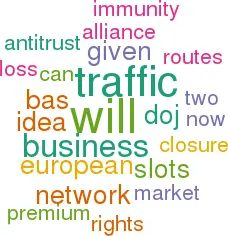BA thinking the unthinkable
January 2002


BA’s top managers have been told to think the unthinkable about the airline’s future strategy. Their thoughts are due in February. In the meantime, here are some of the issues they will be addressing.
The latest traffic figures for BA were better than market expectations, and the share price has recovered somewhat — in early January it was trading above £2 mark, having fallen below £1.30 immediately after September 11.
However, this may be a false dawn as yields are suffering from the need to generate traffic through fare promotions and premium traffic is still very weak.
JP Morgan is forecasting a £600m net loss for the current financial year to March 2002 and a £400m loss for the 2002/03 financial year. Reports that BA is considering a £1bn rights issue seem unlikely given this gloomy profits outlook and uncertainty over the rate of traffic recovery.
BA/AA and antitrust immunity
The price of an antitrust–immunised agreement is becoming a bit clearer. The US DoJ has demanded the divestiture of 126 Heathrow slots, down from the 216 slots required in 1998
However, the DoJ will only grant antitrust immunity on two routes, Heathrow–New York and Heathrow–Boston. The assumption here is that the 126 slots divested would be given to other carriers which would then be able to offer an additional seven daily round trips to New York and two daily round trips to Boston. Antitrust immunity will not be given, under the present proposals, on the routes to AA’s hubs at Chicago and Dallas
The situation is further confused as it is the US DoT, not the DoJ, that has the final say.
Moreover, BA has two other European regulatory battles. One would normally expect BA to get an easier ride from the UK authorities (Office of Fair Trading) than from Brussels. On the other hand, the EC has voiced some concern over the lead that the Star Alliance has been able to obtain over oneworld.
BA’s and AA’s initial statements on the US DoJ demands suggest they are regarded as harsh but with further negotiation might be acceptable. In the background is the likelihood that the European Court of Justice will give the EC powers to negotiate traffic rights with the US.
The assumption is that the EC will then start to amalgamate the existing bilateral open skies agreements signed by individual EU members and the remaining restrictive bilaterals into a "single European open sky" initiative.
BA’s Board has got to decide whether, given the regulatory demands, oneworld is worth pursuing.
The alliance must carry less importance now that BA is in downsizing mode and when the very future of the airline is on the line. On the other hand, could favourable alliance news support a "rescue rights issue"
"Future Size and Shape" study
Cynics might say that BA is conducting a carefully orchestrated number of leaks regarding this study. Scare the workforce with draconian cutbacks and then announce something less severe.
Still, there are indications of a major shakeup:
- Closure of large part of Gatwick operation (although BA appears to be back–tracking on this idea, perhaps noting the enthusiasm with which easyJet is applying for slots at the airport).
- Closure of short–haul routes to "secondary European cities" (Lyons, Pisa, Bologna, Venice, for example, all of which have low–cost airline competition)
- Closure of more long–haul services, marginal as a result of September 11. BA’s Board will have to judge the following:
- How far BA can go in cutting costs and the network without alienating staff? BA cannot afford a repeat of the 1997 cabin crew dispute.
- How swiftly traffic will recover, and whether there will be any permanent loss of premium traffic (through increased use of video–conferencing, etc)? Rod Eddington has launched a promotional campaign to encourage business travellers back in the air — the message is that there is no substitute for doing business face–to–face.
- How to stimulate business travel? BA is currently promoting business travel in both business and premium economy classes.
- The extent to which the short/medium haul network can be cut back without damaging the longhauls and conceding more market share to the low–costs. The radical idea of reverting to a BOAC–type operation has been dropped idea.
Indeed, Eddington has now said that BA has no choice but to maintain a short–haul network as the only way it can make money is as a full service network carrier.
- What to do with the 757s and 767s that are now surplus to requirements. Selling them in today’s market is an not attractive idea.
| October | November | December | |
| Passenger traffic | -25.0% | -18.0% | -10.0% |
| decline | |||
| Passenger load | -8.1% | -2.4% | +1.5% |
| factor change | |||
| Premium traffic | -36.0% | -24.0% | -18.0% |
| decline | |||
| Non-premium | -22.0% | -16.0% | -9.0% |
| traffic decline |